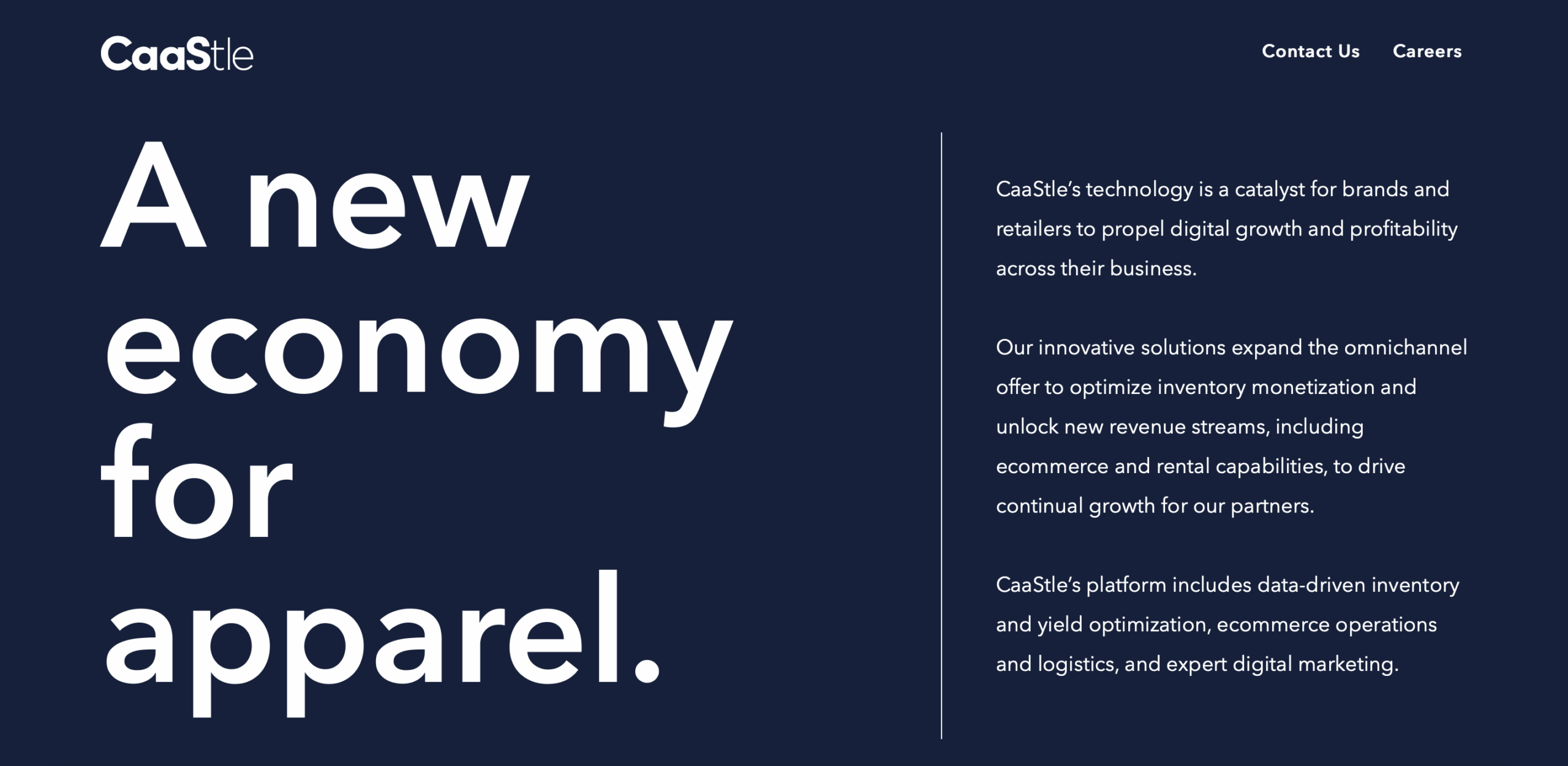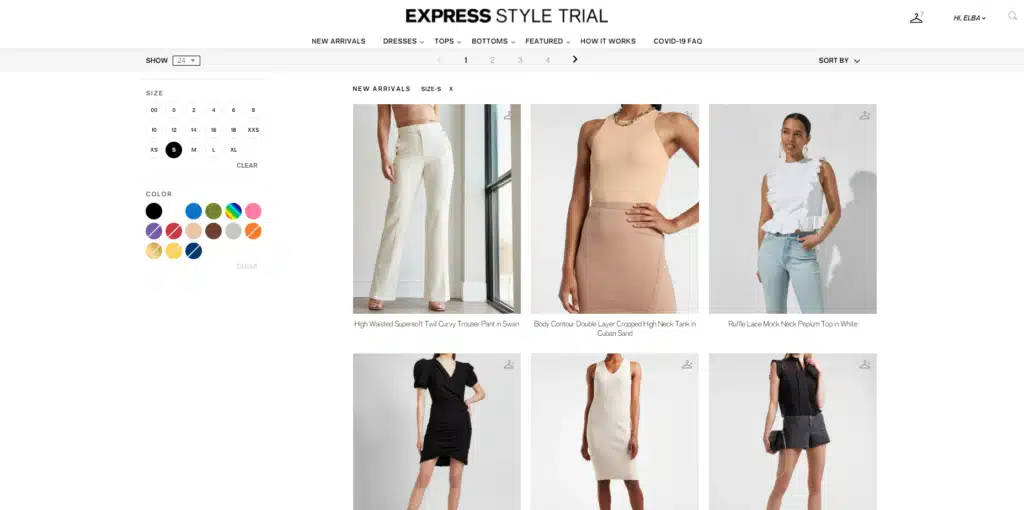CaaStle was slated to revolutionize the trillion-dollar fashion industry by allowing brands to seamlessly rent their wares to fickle consumers. With easy to use B2B technology and a long list of fashion industry partners, CaaStle’s founder and CEO Christine Hunsicker was – until very recently – busy wooing prospective investors with that exact précis and numbers to back it up. This included revenue projections for 2024 and 2025 of roughly $793 million and $1 billion, respectively, and claims that the “clothing as a service” company had “hundreds of millions” in cash on hand as of mid-2024. The accomplished entrepreneur was reportedly looking add to the $530 million in venture capital the company had already raised.
Fast forward to 2025, and CaaStle is teetering on the edge of collapse. With little cash left in its coffers, the company secured a $2.75 million bridge loan last week, and its board is weighing its options, including bankruptcy and liquidation. Ms. Hunsicker resigned on April 1 after CaaStle’s board accused her of misrepresenting the company’s performance to investors, and two new lawsuits appear to mark the beginning of an avalanche of legal troubles for the once-celebrated company and its founder.
Behind the stunning fall of CaaStle (which rebranded from Gwynnie Bee in late 2018) is growing legal momentum, with at least two lawsuits targeting the 14-year-old tech company and Hunsicker over what is being called an “elaborate fraud” akin to Theranos, Madoff, and Enron.
“One of the Largest Frauds in History”
In a sweeping lawsuit filed in the New York Supreme Court on April 18, P180 – a fashion-focused financing and operating company – is accusing CaaStle of engaging in “one of the largest frauds in history,” one that ultimately cost it over $58 million. The complaint alleges that Hunsicker falsely depicted CaaStle as having hundreds of thousands of subscribers, scalable rental technology, and strong distribution capabilities, when the company really had only a few hundred subscribers, under $20 million in 2024 revenue, and was hemorrhaging cash.
According to the suit, retail veteran Brendan Hoffman launched P180 with the sole purpose of “own[ing] or invest[ing] in apparel companies that would utilize CaaStle’s technology.” The New York-headquartered entity was created in close collaboration from Hunsicker, who allegedly wooed Hoffman with “fraudulent claims” about CaaStle’s tech, logistical prowess, and ability to boost revenue and profitability for fashion brands.

The problem, per P180: “CaaStle knew that [its] entire endeavor was a sham. [It] knew that its technology was a dud and could not effectively scale: Its revenues were about $15 million, not hundreds of millions. CaaStle knew it could not efficiently tap an e- commerce ecosystem handle the distribution demands placed upon it. And CaaStle knew that its network of subscribers was little more than a mirage.”
Not limited to Hunsicker’s alleged misrepresentations, P180 alleges that CaaStle is in the wrong, as its board and senior leadership were aware of the company’s “huge financial issues” in December 2024 and opted to to mislead P180 through March 2025 instead of alerting it about the mounting financial turmoil. Hunsicker and other CaaStle directors, who also sat on P180’s board, failed to disclose material facts and allegedly used their influence to push transactions that would benefit CaaStle or delay the exposure of its financial misstatements, P180 contends.
Against that background, P180 is waging a slew of causes of action against CaaStle, including fraud and fraudulent inducement, alleging that CaaStle knowingly misled P180 into acquisitions and debt obligations; negligent misrepresentation, for providing false information about its subscriber network and technological capabilities; and aiding and abetting breach of fiduciary duty, by allowing conflicted directors to act against P180’s interests.
The complaint also includes claims for conversion and unjust enrichment, asserting that CaaStle misappropriated P180’s funds, as well as breach of contract and breach of the covenant of good faith and fair dealing in connection with two 2024 commercial agreements that P180 argues are void due to fraud.
Hunsicker, who recently vacated the role of chairwoman at P180, is not named as a defendant in P180’s lawsuit.
Expansive Infringement, Contract Breaches
Not the only CaaStle-centric lawsuit on the New York Supreme Court’s docket, Express-owner EXP Topco, LLC is taking on CaaStle and Hunsicker in a separate fraud, trademark infringement, and breach of contract case. According to EXP, which acquired the EXPRESS trademarks from Express, Inc. in 2022, the matter centers on CaaStle’s operation of “Express Style Trial,” a platform it launched in 2019 to rent Express-branded apparel.
“Recognizing that [CaaStle] was actively infringing its rights,” EXP claims that Hunsicker approached it in early 2024 with a proposed deal. After lengthy negotiations, the parties reached a near-final license agreement by December. The deal would have allowed CaaStle to continue operating the rental service under the EXPRESS name in exchange for “millions of dollars in guaranteed minimum royalties to EXP.” But just before signing, CaaStle backed out – a move that coincided with its board uncovering far-ranging financial misconduct by Hunsicker.

After CaaStle backed out of the license deal, the parties reached a separate settlement agreement in March 2025 under which CaaStle would pay EXP an undisclosed sum and wind down the Express rental service. However, “just ten days after entering the final settlement agreement,” CaaStle breached its obligation to make the payment, citing lack of funds. EXP claims that CaaStle would not cease its “unlawful” use of the EXPRESS trademarks or its operation of the Express Style Trial website despite repeated demands.
Against that background, EXP sets out claims of breach of contract (of both the failed license agreement and the subsequent settlement), trademark infringement, and unjust enrichment. The company is seeking monetary damages, restitution, and an injunction against any further use of the EXPRESS marks by CaaStle.
P180 is not named as a defendant in the EXP case, but the company states that “to the extent P180 has been the beneficiary of any fraudulent transfers of CaaStle funds, or is otherwise liable to EXP, EXP will amend its complaint to add P180 as a defendant.”
Just the Tip of the (Legal) Iceberg?
These complaints, while limited to CaaStle and Hunsicker’s dealings with P180 and EXP, still paint a broader picture of a tech-enabled fashion venture that collapsed amid internal chaos and misleading financials and shed light on some of the legal exposure at play.
In addition to detailing the alleged legal missteps of CaaStle and its founder in connection with the P180 venture and the EXPRESS trademarks and the parties’ agreements, the lawsuits suggest that CaaStle’s legal issues could be even more extensive than meets the eye. After all, in addition to EXPRESS, CaaStle boasted partnerships with the likes of Ralph Lauren, Ba&sh, Maje, Ann Taylor, Banana Republic, and Vince, providing retail rental technology, as well as inventory management and logistics to enable these companies (and many others) to offer rental services.
It is also not immediately clear if – or how – the companies in which P180 maintains stakes will come into the fold. The company owns 25 percent of the Altuzarra brand and 60 percent of Nasdaq-traded Vince.
“I am both shocked and saddened by the recent developments at CaaStle,” Hoffman said early this month. “Christine Hunsicker has stepped down as chairman of P180 which operates as an independent entity. Our primary focus moving forward is to nurture and grow Vince Holding Corp. and support our investment in Altuzarra.”
As for CaaStle, the company said in a statement this month, “Our immediate focus is on addressing the company’s challenges, supporting our employees, and preserving the value of our technology and business operations. We regret having to temporarily furlough our employees, but we believe this will best position the company to successfully recover from our current situation.”
The cases are P180, Inc v. CaaStle, Inc., 652451/2025 (N.Y. Sup.) and EXP Topco, LLC v. CaaStle Inc., 652221/2025 (N.Y. Sup.).














